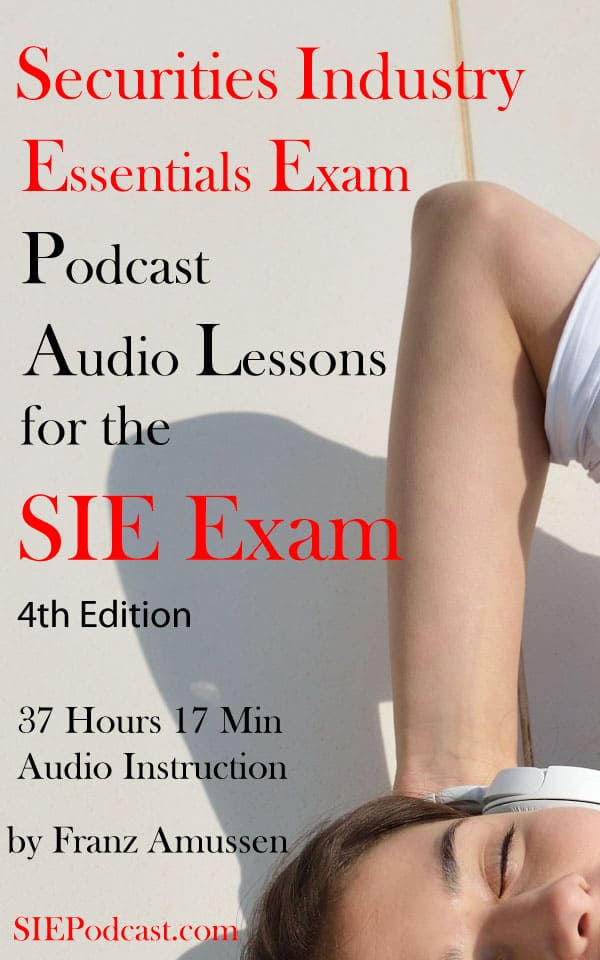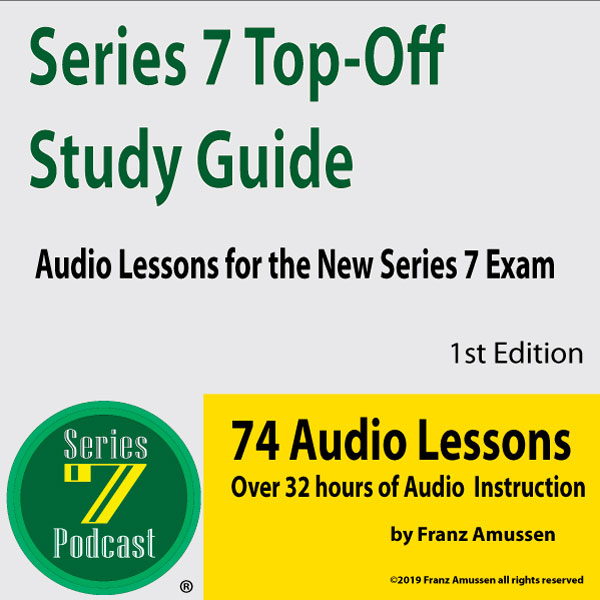Podcast: Play in new window | Download (Duration: 11:21 — 4.6MB)
Series 7 Top-Off Exam Quiz Lesson 6 Securities Exchange Act of 1934
This is Series 7 Top-Off Exam Quiz Lesson 6 Securities Exchange Act of 1934
1. Which of the following is true about the Securities Exchange Act of 1934?
(Select all that apply.)
A. It applies to exempt securities.
B. It determines what fair trading practices are.
C. It regulates the secondary trading of securities.
D. It was established by the Securities and Exchange Commission.
2. Which of the following is contained in a 10-K? (Select all that apply.)
A. balance sheet
B. cash flow statement
C. compensation of officers
D. income statement
3. The 10-Q is an audited financial report submitted quarterly to the Securities and Exchange Commission.
A. True
B. False
4. A ___ is filed if the company changes its name or there’s a 5% or greater change in the number of shares outstanding.
A. 10-C
B. 13-G
C. 15-B
D. 8-K
5. Which of the following is required from the broker-dealers by the Securities Exchange Act of 1934?
(Select all that apply.)
A. buy back stocks for customers that reneged on their transactions
B. electronically deliver clients’ confirmation and statements
C. maintain a minimum net capital
D. send customers a copy of their income statement
6. Under ___, margins are regulated from brokers to their customers.
A. Regulation D
B. Regulation M
C. Regulation T
D. Regulation U
7. Broker-dealers are allowed to disclose to customers the routing of the customers’ orders.
A. True
B. False
8. It is a totally anonymous matching of buy and sell orders.
A. alternative trading system
B. electronic exchange
C. electronics communication network
D. physical exchange
9. Which of the following are/were physical exchanges?
(Select all that apply.)
A. Cincinnati Stock Exchange
B. New York Stock Exchange (NYSE)
C. Pacific Stock Exchange
D. Philadelphia Stock Exchange
10. Which of the following is true about penny stocks?
(Select all that apply.)
A. They are sold on the over-the-counter bulletin board.
B. They are unsolicited orders.
C. They are traded on the NASDAQ and other listed exchanges.
D. They sell at less than $5.
11. The broker is not required to assess a penny stock buyer’s financial situation if the buyer is a/an ___.
(Select all that apply.)
A. accredited investor
B. client whose order is unsolicited
C. insider
D. interstate citizen
12. It is trading on nonpublic material information on the company.
A. front running
B. insider trading
C. pegging
D. wash trade
13. This is the catchall rule that prohibits anything fraud even if it is not specifically prohibited in the Securities Exchange Act of 1934.
A. Rule 10b-5
B. Rule 127-c
C. Rule 144A
D. Rule 145
14. For unlawful practices under the Securities Exchange Act of 1934, suits can be brought within ___ of discovery.
A. six months
B. one year
C. two years
D. three years
15. If a control person owns a position of a stock and he wants to lock in his profit or loss, he can ___.
A. dribble out
B. peg the stock
C. short against the box
D. short sell the stock
16. Anybody that has nonpublic material information on the company is considered an insider.
A. True
B. False
17. In the United Sates, they are exempted from the rules that prohibit insider trading.
(Select all that apply.)
A. congressmen
B. directors of the company
C. officers of the company
D. senators
18. Insiders can trade on the material nonpublic information once the information has been made public.
A. True
B. False
19. Only the Securities and Exchange Commission can sue insider traders.
A. True
B. False
20. The statute of limitation for insider trading is ___.
A. one year
B. three years
C. five years
D. ten years
Series 7 Top-Off Exam Quiz Lesson 6 Securities Exchange Act of 1934
The Series 7 Top-Off Study Guide Audio Lessons for the New Series 7 Exam is the most comprehensive set of audio lessons which is available for the preparation to take the New Series 7 Top off Examination the course consists of 74 lessons which amounts to 32 hours and 27 min. in total length. Audio lessons are a supplement and not a substitute for the book learning that you should also be doing. Audio lessons simply allow you to learn comprehend and reinforce what you should also be learning through normal studying methods such as attending classes, reading books, and taking practice quizzes.
The full table of contents for the Series 7 Top-Off Study Guide is located here
The New Series 7 Top- Off Study Guide Audio Lessons is 74 lessons and a Total Length 32 hours 27 Min
 The full table of contents for the Securities Industry Essentials Exam Podcast Audio Lessons for the SIE Exam is located here
The full table of contents for the Securities Industry Essentials Exam Podcast Audio Lessons for the SIE Exam is located here
Effective October 1, 2018 Financial Industry Regulatory Authority (FINRA) changed the licensing of those that wish to work in the financial services industry. There is now a required prerequisite for most of the Licensing tests and this is the Securities Industry Essentials Exam
Securities Industry Essentials Exam is a new FINRA exam for prospective securities industry professionals. This introductory-level exam assesses a candidate’s knowledge of basic securities industry information including concepts fundamental to working in the industry, such as types of products and their risks; the structure of the securities industry markets, regulatory agencies and their functions; and prohibited practices.
Unlike the licensing exams such as the Series 4, 6, 7, 9, 10… which require the candidate to be employed by a member firm, Securities Industry Essentials Exam is open to anyone over the age of 18 including students and prospective candidates interested in demonstrating basic industry knowledge to potential employers.
Association with a firm is not required, and individuals are permitted to take the exam before or after associating with a firm.
Essentials exam results are valid for four years.
Check out our podcast for the SIE Exam
Here is a link to our other study products



